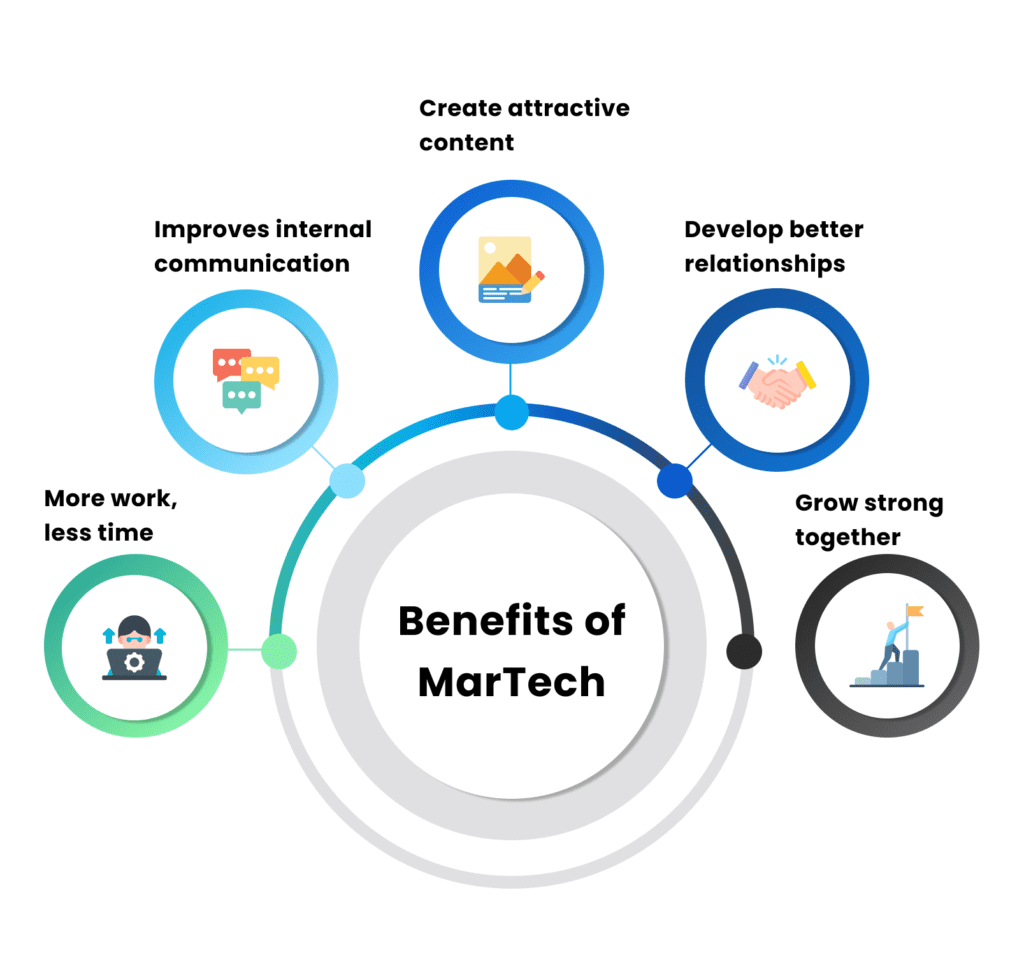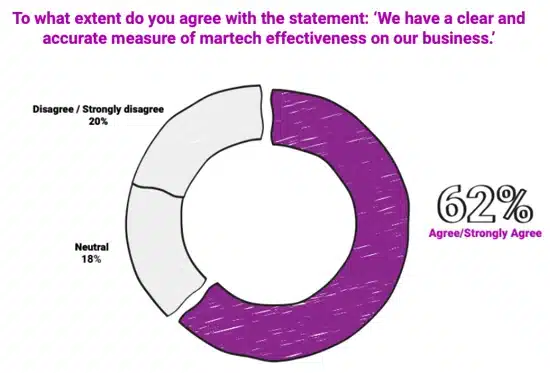
The MarTech Dilemma: How Do You Decide Whether to Try or Implement a Tool?
Marketing technology (MarTech) is indispensable because it assists companies as they attempt to attract customers and understand their needs. However, with over 14,000 MarTech solutions available in 2024, marketers face an overwhelming array of options when identifying the correct MarTech tools to implement.
Choosing the right MarTech tools to implement can significantly boost efficiency and ROI, yet 80% of businesses struggle with integrating new technologies effectively. As a result, they fail to make full use of the tools they purchase.
The rise of MarTech promises innovation and growth, but it also presents a critical dilemma: when should you trial a new tool, and when is it time to implement it fully? This guide will help you determine which MarTech tools will work for your company so you can make informed choices that drive your marketing strategy forward.
Quick Takeaways
- Finding the right MarTech tools to implement can aid your marketing efforts.
- You’ll need to determine which tools fit your company.
- Trying these tools before implementing them is vital.
- Evaluating the trial ensures you end up with beneficial tools.
Understanding the MarTech Landscape
Marketing technology refers to the software and tools marketers use to plan, execute, and measure marketing campaigns. MarTech’s scope is broad, encompassing everything from email marketing platforms to advanced data analytics tools. These tools aim to streamline marketing processes, improve customer engagement, and ultimately drive better business results.
There are several types of MarTech tools that marketers commonly use:
- Customer Relationship Management (CRM): These tools help manage interactions with current and potential customers, offering insights into customer behavior and helping to improve relationships and sales.
- Marketing Automation: Tools in this category automate repetitive marketing tasks such as email campaigns, social media posting, and ad management, freeing up time for marketers to focus on strategy and creativity.
- Analytics and Data Management: These tools collect and analyze data from various sources, providing valuable insights into campaign performance, customer preferences, and market trends.
- Social Media Management: These platforms help manage social media accounts, schedule posts, and analyze engagement metrics to enhance social media strategies.
We’re seeing increasing use of AI and machine learning, too, which help predict customer behavior and personalize marketing efforts. The integration of MarTech tools with other business systems is also evolving and creating a seamless flow of information across the organization.

Learning about the available tools can help marketers make informed decisions about which MarTech solutions to try and implement.
The Importance of Properly Evaluating MarTech Tools Before Implementing Them
Thoroughly assessing each tool is crucial before diving into the latest MarTech solutions. Careful evaluation ensures you invest your time, money, and resources wisely, avoiding pitfalls from hasty decisions on which MarTech tools to implement.
Meet Your Company’s Needs
Evaluating MarTech tools helps you determine if a tool genuinely meets your specific needs. Every business has unique requirements, and a tool that works wonders for one company might not suit another. By assessing a tool’s features and capabilities against your goals, you can ensure it aligns with your marketing strategy and objectives.
Avoid Wasting Resources
Assessing these tools helps you preserve resources. Investing in the wrong MarTech solution can lead to financial losses and hours spent trying to make an unsuitable tool fit. This misallocation of resources can strain your budget and reduce overall productivity.
Prevent Slowdowns
Adopting the wrong tool can disrupt your existing workflows. A tool that doesn’t integrate well with your current systems can cause operational inefficiencies and create friction among your team members. This disruption can lead to delays, errors, and frustration, negatively impacting your marketing efforts.
Stay Compliant
Careful evaluation helps you stay compliant with data privacy regulations. Some tools might not adhere to the necessary standards, posing legal risks to your business. Ensuring a tool is compliant protects your company from potential fines and reputational damage.
Assessing MarTech tools thoroughly before implementation helps safeguard your resources, maintain smooth workflows, and ensure legal compliance, setting your marketing efforts up for success.
Criteria for Trying a MarTech Tool
Deciding whether to try a new MarTech tool involves several key criteria to ensure it’s a good fit for your business:
- Identifying Specific Marketing Needs and Challenges: Pinpoint the marketing problems you must solve. Whether your goals are improving customer engagement, automating repetitive tasks, or gaining better insights through data analytics, understanding your needs will guide you to the right tool.
- Assessing Compatibility with Existing Systems and Workflows: Check if the new tool can integrate smoothly with your current systems and processes. Compatibility is crucial to prevent disruptions and ensure a seamless transition. The tool should enhance your workflow, not complicate it.
- Considering Scalability and Future Needs: Think about your company’s growth trajectory. Your chosen tool should scale with your business, accommodating increased workloads and expanded functionality as your marketing efforts develop.
- Evaluating Cost and Budget Constraints: Budget is a significant factor. Analyze the tool’s cost relative to its potential benefits. Ensure it fits within your budget without compromising on essential features. Consider initial costs and ongoing fees to get a complete picture of the financial commitment.
Carefully considering these criteria helps you decide which MarTech tools are worth trying, setting the stage for successful implementation.
How to Trial a MarTech Tool
Conducting a successful trial of a MarTech tool involves strategic planning and collaboration. Here’s how to ensure your trial period is practical and informative:
Set Clear Objectives
Begin by defining what you want to achieve with the trial. Establish specific, measurable objectives such as improving email open rates, reducing customer acquisition costs, or streamlining campaign management. Clear goals will help you assess the tool’s effectiveness.
Involve Key Stakeholders in the Trial Process
Engage all relevant team members, including marketing, IT, and sales departments. Their input and collaboration are crucial for a comprehensive evaluation. Ensure everyone understands the trial’s objectives and how the tool fits into broader business processes.
Monitor Performance Metrics and User Feedback
Track key performance indicators (KPIs) aligned with your trial goals. Gather feedback from users to identify the strengths and weaknesses of the tool. Regular monitoring and open communication will provide valuable insights into the tool’s practical utility and user satisfaction.
Establish a Timeline for the Trial
Set a specific duration for the trial, long enough to gather meaningful data but short enough to maintain momentum and focus. Typically, a trial period of 30 to 90 days works well. Ensure you have checkpoints to review progress and make adjustments as needed.
Maximizing the effectiveness of your MarTech tool will take some effort, but it ensures you make well-informed decisions about its potential for full implementation.
Deciding If You Have the Ideal MarTech Tools to Implement
After completing a trial, the next step is deciding whether to implement the MarTech tool fully. Here’s how to make an informed decision.
Analyze Trial Results Against Predefined Objectives
To start, you’ll need to analyze the trial data you collect. This involves the following steps:
- Review the data collected during the trial period
- Compare the results with your initial objectives to see if the tool met or exceeded expectations
- Look for measurable improvements in KPIs
Assess ROI and Potential Long-Term Benefits
Next, you can assess whether the tool is beneficial to your company:
- Evaluate the ROI by weighing the tool’s cost against the benefits observed during the trial
- Consider long-term gains such as increased efficiency, higher customer engagement, and revenue growth
- Ensure the tool’s advantages justify the expense
According to a recent survey, only 62% of companies understand how much of a return their MarTech tools offer.

Taking the time to learn how much good these tools are doing for your organization puts you in a better position moving forward.
Consider Feedback from All Stakeholders
Gather input from everyone involved in the trial. Their experiences and insights can provide valuable perspectives on the tool’s usability and impact on workflows. Positive feedback from key stakeholders can reinforce the decision to implement.
Ensure Adequate Support and Training Resources are Available
Confirm that there are sufficient resources for ongoing support and training. Proper onboarding and continuous training are crucial for maximizing the tool’s potential and ensuring smooth adoption by your team.
Plan for Integration with Existing Tools and Systems
Ensure the tool can integrate seamlessly with your current systems. Plan for a smooth transition by addressing technical challenges and preparing your team for the change. Effective integration minimizes disruption and enhances overall efficiency.
Examining these factors can assist as you make a well-informed decision about implementing the MarTech tool, ensuring it aligns with your business goals and resources.
Find the Right MarTech Tools to Implement
MarTech tools are everywhere, but their mere existence doesn’t necessarily mean they suit your company. Take the time to try a few tools to determine if they’ll help you become more efficient, and from there, you can begin the onboarding process. Remember, just because a tool works for one business in your industry doesn’t necessarily mean it’s right for you.
No matter the MarTech tools you utilize, you’ll need the right content to drive engagement, and Marketing Insider Group can help. Contact us to learn about our Content Builder Services or request a free consultation.






